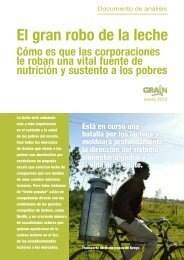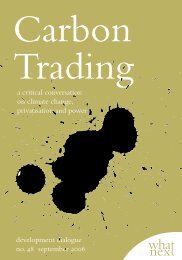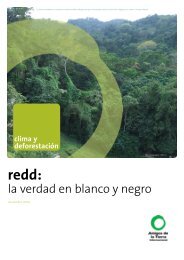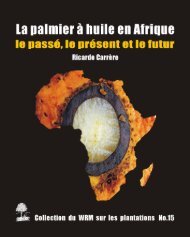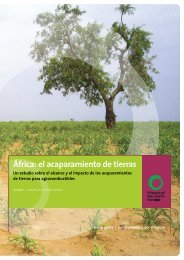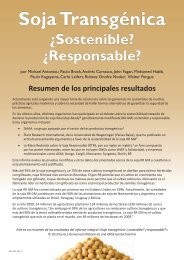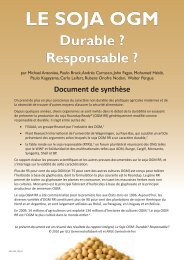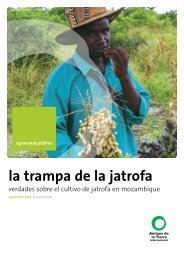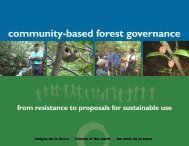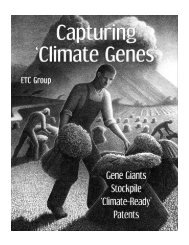Plantations, poverty and power - Critical Information Collective
Plantations, poverty and power - Critical Information Collective
Plantations, poverty and power - Critical Information Collective
You also want an ePaper? Increase the reach of your titles
YUMPU automatically turns print PDFs into web optimized ePapers that Google loves.
75<br />
Management’s experts the possibility to operate successfully worldwide in different environments,<br />
sharing their h<strong>and</strong>s-on expertise for the client’s benefit.” 371<br />
Consultants <strong>and</strong> conflict of interest<br />
Pöyry describes its work in the South as “sustainable forestry development”. 372 It is, of course, nothing of<br />
the sort. Pöyry’s activities illustrate the conflict of interest faced each time the company is employed to<br />
carry out a study of a proposed pulp <strong>and</strong> paper development.<br />
“Consulting firms have a conflict of interest as long as they themselves may benefit from one outcome<br />
over another,” a Nordic consultant speaking on condition of anonymity told journalist Ann Usher in the<br />
1990s. “For example,” he continued,<br />
“if they find that a certain project is feasible, they are often in a good position to undertake the subsequent<br />
studies, design work <strong>and</strong> construction supervision associated with further project phases (which is often<br />
more profitable than the initial feasibility study). . . . This conflict could be avoided if the evaluation were<br />
carried out by an impartial party which was aware that it would not subsequently receive any further<br />
project-related work, regardless of evaluation outcome.” 373<br />
Pöyry’s role in Indonesia illustrates this conflict of interest. In the 1980s, when Pöyry’s “experts” started<br />
to work in Indonesia, they could have explained that a massive expansion of the pulp <strong>and</strong> paper industry<br />
in Indonesia would bring with it billions of dollars of debt, l<strong>and</strong> conflicts, destroyed forests, destroyed<br />
livelihoods <strong>and</strong> polluted rivers. They might have suggested that perhaps it would be better not to exp<strong>and</strong><br />
the pulp <strong>and</strong> paper industry. Had they done so, however, there would have been nothing more for<br />
industrial forestry consultants like Pöyry to do. As it was, Pöyry won contracts on several of the pulp mill<br />
projects that they had recommended should be built. Local communities <strong>and</strong> their environments end up<br />
paying the price for this conflict of interest.<br />
Economic hit men<br />
Pöyry can perhaps best be described as the “economic hit men” of the forestry world. The phrase comes<br />
from John Perkins’ book, “Confessions of an Economic Hit Man”. In the book, Perkins describes how he<br />
worked as a consultant in the 1960s in Indonesia. He <strong>and</strong> his colleagues produced reports aimed at<br />
persuading the Indonesian government that it needed massive investment in electricity generation to<br />
<strong>power</strong> the industrial development of the country. Perkins <strong>and</strong> his colleagues over-estimated the<br />
anticipated dem<strong>and</strong> for electricity. A raft of US-based companies, with funding from the World Bank,<br />
came in to build the necessary infrastructure. 374<br />
Pöyry started working in south-east Asia in the early 1970s <strong>and</strong> played a key role in setting up deals in the<br />
pulp <strong>and</strong> paper industry, benefiting from a range of aid-funded consultancies. David Sonnenfeld, an<br />
371 Patrick Sundholm (2002) “Mill performance improvement through close teamwork with the client”, Know-How<br />
Wire, Jaakko Poyry Magazine, December 2002.<br />
372 Tove Selin (2004) “Jaakko Pöyry <strong>and</strong> the Fin(n)ished Forests of the Mekong Region”, Watershed, Vol. 9, No. 3,<br />
March-June 2004. http://terraper.org/pic_water/Watershed%209(3).pdf<br />
373 Ann Danaiya Usher (Ed.) (1997) Dams as Aid: A political anatomy of Nordic development thinking, Routledge. page<br />
68.<br />
374 John Perkins (2004) Confessions of an Economic Hit Man, Berret-Koehler Publishers Inc.



